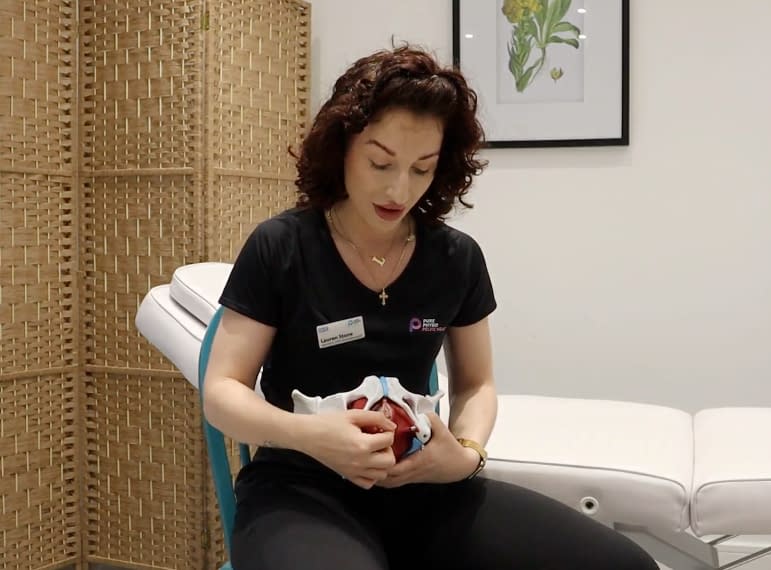Women’s Health
Women’s Health is a specialised branch of healthcare that focuses on treating and managing physical and emotional issues specific to women across all stages of life.

Our structured primary care Women’s Health support programme, delivered by specialist physiotherapists, is designed specifically to help women receive early supportive advice, education and treatment to reduce the burden on the wider health system as well as primary care.
Our accredited and qualified Women’s Health physiotherapists have extensive experience in supporting women with issues specific to them in relation to their pelvic health and urogynaecological problems such as post-natal or menopausal incontinence, prolapse and pain. Treatment will focus on improving patients’ independent management of their condition, providing support and increasing their confidence.
The Problem
Tens of thousands of women suffer (often in silence) with women’s health problems:
- In the UK over 600, 000 women give birth each year: 1 in 3 of these women will have post-natal urinary incontinence.
- We have over 11 million women over 55 in the UK: 80% of women will suffer from some form of genitourinary problems.
- In terms of lifetime prevalence: 50% of women suffer from some level of pelvic prolapse & 50% will suffer from some form of urinary incontinence in their life.
There is an increased drive in healthcare agenda to promote and support women’s health:
- The NHS Long Term Plan (2019)- emphasises the importance of pelvic-health physio to support women who need it to recover from birth.
- The Department of Health & Social Care Policy Paper: Women’s Health Strategy for England (2022) – puts focus on improving services within women’s health in terms of access times & quality of care.
- The new NHS Post-Natal Checks guidance (2024)- Since the GP contract regulations were amended in 2020 there is now a contractual requirement to offer women a maternal postnatal consultation by a GP at 6- 8 weeks post-natal. This was revisited in 2023 NHS guidance “Post natal care – what good looks like” – to ensure post-natal checks are meeting NICE post-natal guidelines (2021).


The Solution
Supported pelvic floor exercises and advice delivered by women’s health physiotherapists is the first line evidence-based treatment for overactive bladder, urinary incontinence, and pelvic floor prolapse- as outlined in NICE Guidelines (NICE guideline [NG123]).
Physiotherapy is by far the most cost-effective treatment for mild to moderate incontinence and prolapse (NHS Long Term Plan, 2019).
Having women’s health FCPs embedded within your PCN reduces the workload of busy clinicians such as GPs and ANPS & avoids admin time involved in lengthy referrals to urogynaecology or secondary care women’s health physiotherapy services.
This service is not only optimal for primary care but also for patients: having women’s health First Contact Practitioners significantly reduces waiting times for patients, who will have direct access to women’s health services within an FCP model, enhancing quality of care for our patients.
Conditions We Treat
Pregnancy-Related Pain
Back and pelvic pain during pregnancy are common issues. Our specialist physios can assess your situation, develop a treatment plan, and provide ongoing support throughout your pregnancy to address the pain and keep you moving comfortably.
Post-Natal Check & Recovery
Discuss your birth experience, ask any questions and go through an assessment of your pelvic floor with our specialist physios. Can include a diastasis check (the tummy gap), a c-section scar check, and more.
Pelvic Organ Prolapse
The descent or displacement of pelvic organs such as the uterus, bladder, or rectum into the vaginal canal. This can cause pain, pressure, and urinary incontinence.

Incontinence (or 'bladder leaks')
Involuntary leakage of urine from the bladder. There are two main types: stress urinary incontinence and urge urinary incontinence.

Pelvic Pain
This can be caused by endometriosis, pelvic floor issues, PCOS, and many other conditions. Our specialist team can help work out a plan to suit your needs and goals.

Menopause
Perimenopause and menopause can, for some, come with a long list of symptoms: our expert team can help you find the right balance to live a strong, healthy, and pain-free menopause.
Cost Savings
Our women’s health FCP service can be implemented cost effectively and aligns with clinical guidelines. It utilises existing funding streams from NHS England to minimise financial burden, maximise patient impact and can create cost savings by reduced spend on prescriptions and other related costs for the conditions treated. It leverages existing funding structures like ARRS to support services without substantial financial strain.

Our Approach
The initial assessments are conducted remotely, and the appointment can be easily integrated into existing practice systems. The 20-minute consultation, conducted by a specialist Women’s Health physiotherapist, aligns with the standard First Contact Practitioner structure. It covers key areas for onward management, safety netting and a face-to-face follow-up appointment with a women’s health FCP can also be offered.
Overall structure of our women’s health FCP service:
1
Initial telephone/ remote consultation for assessment, advice, and education.
2
Face-to-face consultation weekly or monthly clinics held on site by Women’s Health First Contact Practitioner physio.
3
Remote OR face-to-face follow-up consultation for ongoing support as and when needed.
4
Direct referral to local community and secondary care services (if agreed with the PCN).
5
Linking with the existing primary care multidisciplinary team (typically GPs, pharmacists, social prescribers and health and wellbeing coaches).

Tailored Approach
Each service is tailored to local need and requires engagement from both practices and us to ensure effectiveness. In line with best practices, we collect patient feedback and outcome measures that can inform business cases for expanding Women’s Health services in primary care as well as local and national research.
Contact us today to learn more about the service and how we could work with you to improve your Women’s Health offer.